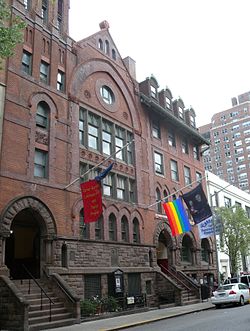 |
![[ Composer's Voice ]](http://www.voxnovus.com/img/Composers_Voice_Collaboration_Logo.png) |
| April 27, 2008 | |
| Jan Hus Church 351 East 74th Street New York, New York 10021 |
| This composer's Voice specifically features the Iktus Percussion Quartet. Vox Novus, Remarkable Theater Brigade, and Jan Hus Church collaborate together to present Composer's Voice, a monthly concert series championing the work of living composers. | |
| Title | Composer | Performer |
| Fugue | Charles Corey | Iktus Percussion Quartet |
| The Short, Sad Story of the Guinea Pig | Eric Schwartz | Iktus Percussion Quartet |
| No More Boomerang | Leonard Lehrman |
Helene Williams - soprano and Leonard Lehrman - piano |
| fairytale | Leonard Lehrman |
Helene Williams - soprano and Leonard Lehrman - piano |
| Drumming | Steve Reich | Iktus Percussion Quartet |
| Performers | |
| Based in New York City, the Iktus Percussion Quartet ( Roy Campbell, Chris Graham, Danielle Weinberg, and Justin Wolf) is an ambitious, dynamic young ensemble committed to expanding the boundaries of the percussion genre. Iktus is influenced by the vibrant forces of the contemporary music scene, including electroacoustic music and the synthesis of diverse musical traditions from around the globe. As a group with strong ties to the local artistic community, Iktus is dedicated to performing and commissioning new compositions from emerging artists. | |
| Soprano Helene Williams grew up in N.Y. City and has performed throughout Europe, North America, Latin America, Australia and Israel. Her recordings with Leonard include 3 on Capstone, 3 on Original Cast, 2 on Premier, and one each on Opus One and Albany. A co-founder of The Bronx Opera Company , Helene is a student of Cornelius Reid, teaches voice privately in the NY metropolitan area, and is on the faculty of Queensborough Community College in Bayside, NY. | |
| Composers | |
 |
Leonard Lehrman (b. 1949) was born in Kansas but grew up in Roslyn, Long Island. He is the composer of 186 works to date, including 10 operas, 6 musicals, and over 400 individual vocal compositions, 147 of them written for soprano Helene Williams, whom he met at auditions in Jan. 1976 & 1987. Together they founded The Elie Siegmeister Society and Court Street Music in Valley Stream, and were married in Manhattan July 14, 2002. After earning a Harvard B.A.'71, Cornell M.F.A.'75 & D.M.A.'77, Lehrman served as Assistant Chorus Master/Assistant Conductor of the Metropolitan Opera 1977-8, founding The Metropolitan Philharmonic Chorus in 1988. In 1991-98 he was President of the Long Island Composers Alliance. On Jan. 1, 2008 he became Music Director/Composer-in-Residence at United Methodist Church of Huntington & Cold Spring Harbor. Lehrman's completion of the opera "Sacco and Vanzetti," commissioned for the Met in 1959, begun but left unfinished by Marc Blitzstein (1905-64), was premiered, concertante with piano, at the White Barn Theatre in Westport CT in August 2001, with a cast of 10 singers, including Helene Williams and Monica Harte. |
 |
Eric Schwartz has studied composition at the Cleveland Institute of Music, New York University, and both the Interlochen and Aspen Summer Music Festivals. Past teachers have included Donald Erb, Margaret Brouwer, George Tsontakis, and Justin Dello Joio. His diverse musical background is also made up of screaming and performance art for various metal and art rock groups, playing guitar in jazz big bands, and accompanying modern dance classes on the piano. Primarily interested in a synthesis of seemingly disparate musical archetypes, Schwartz is always working on a variety of genre bending projects. Schwartz is currently on the music theory faculty of New York University. He is a cofounder/resident composer of the Brooklyn based new music group Forecast Music.. |
"An Australian Odyssey" is the 17th of Lehrman's 20 song cycles, not counting his 15 sonnetinas - settings of sonnets (the most recent of which, a Shakespeare setting, will be heard at St. Marks in the Bowery, Sun. June 22 at 3pm, sung by Helene Williams). Inspired by a correspondence on the subject of the sonnetina with Melbourne poet & editor Alex Skovron, it was premiered by Helene & Leonard at the Bryant Library Dec. 2, 2001 and Chapel Off Chapel in Melbourne Jan.5, 2002. Dedicated to Alex Skovron Oodgeroo Noonuccal (1920-1993), née Kath Walker, was a fighter for aboriginal rights in Australia, wryly observing the effects of Caucasian "civilizing." Ania Walwicz (b. 1951), like Alex Skovron (b. 1948), emigrated from Poland to Melbourne at an early age. Her unpunctuated stream-of-consciousness poetry also sends up Western myths and norms. In both cases, the composer found it appropriate to employ muting, plucking, and other inside-the-piano effects.
AN AUSTRALIAN ODYSSEY (2001)
No More Boomerang (1966)
by Oodgeroo Noonuccal (1920-1993)
No more boomerang
No more spear;
Now all civilized --
Colour bar and beer.
No more corroboree,
Gay dance and din.
Now we got movies,
And pay to go in.
No more sharing
What the hunter brings.
Now we work for money,
Then pay it back for things.
Now we track bosses
To catch a few bob,
Now we go walkabout
On bus to the job.
One time naked,
Who never knew shame;
Now we put clothes on
To hide whatsaname.
No more gunya,
Now bungalow,
Paid by higher purchase
In twenty year of so.
Lay down the stone axe,
Take up the steel,
And work like a nigger
For a white man meal.
No more firesticks
That made the whites scoff.
Now all electric,
And no better off.
Bunyip he finish,
Now got instead
White fella Bunyip,
Call him Red.
Abstract picture now --
What they coming at?
Cripes, in our caves we
Did better than that.
Black hunted wallaby,
White hunt dollar;
White fella witch-doctor
Wear dog-collar.
No more message-stick;
Lubras and lads
Got television now,
Mostly ads.
Lay down the woomera,
Lay down the waddy.
Now we got atom-bomb,
End everybody.
fairytale (1989)
by Ania Walwicz (1951- )
[bracketed words have not been set]
once upon a time there was a king he had three daughters one was very pretty but the two others why they were ugly as hell so he preferred the ugly ones because they were very smart [they were very clever indeed] he said to them don't worry about getting husbands i mean all right if you want i'll arrange that no problems but you should think about studying first the beautiful one was dumb you see so he didn't like her at all [not at all] why don't you like me or something she asked him sorry i don't like you because you are stupid so she cried then this fairy heard her and felt sorry for her she better be sent to remedial classes or something the fairy said so she was to help her improve her spelling and stop paying attention to how she looked and all that so all the sisters were all right with the king after that and all getting good marks and scholarships to university because that's very important but the ugly ones started to worry about just how ugly they were so the king arranged for them to have plastic surgery so they looked a lot better after that and were all all right i think but then they wanted to get married after they got their doctorates [only after that] so that was a problem because they didn't meet many men because they were too busy at their study so the king had to think about what to do because they were driving him crazy all the time talking about getting married and worrying about being old maids so he advertised in the aristocratic gazette for handsome princes to apply so they did but the princesses didn't like them you see they were much too smart for these princes and laughed at them [and so forth] so that was worrying the king who was getting old by then you see he married late so by that time he was in his eighties and maybe would die he wanted to see the daughters settled so this time he advertised for very clever princes and they came but the princesses found them too ugly and said these men are very good to talk to but as far as looks are concerned forget it wouldn't touch them with a ten foot pole and the thought of kissing them just makes us sick well that was a problem what to do now what was the king supposed to do what were the princesses supposed to do and what were the poor unfortunate rejected princes supposed to do the king suggested maybe you could marry two princes apiece a good looking one for sleeping with and a clever one to talk to but that wasn't such a good idea so the princesses thought we got to think of something to do after all we got doctorates and they decided to produce perfect men for themselves the kind that could cook and be polite and wash dishes and be willing and able to tell good stories and the kind that wouldn't annoy them so they set out in the laboratory to combine all the parts of various princes to make good husbands and they worked all night but they didn't mind you see they enjoyed their work and were used to using their heads so lo and behold they made these perfect husbands by sticking all the pieces of various princes together if one had good eyes then they took his eyes too bad for him they had to do it and that was that and some prince would wake up blind too bad they said or take some prince's legs if they were nice legs [they took them] they would take them by special force of their minds [and they took them] and these men would wake up sometimes dead but it was all right for the princesses they didn't mind so they took what they liked and took brains and eyes and legs and shoulders and took hair and took feet a lot of princes died as a result and everybody thought [that] there was a plague and in the end the princesses had their husbands but they got bored with them and killed them because they enjoyed working in the laboratory more than marriage
| Brought to you by | ||||
 |
 |
 |
||
| Home | ||||||||||||
| Calendar | ||||||||||||
| History | ||||||||||||
| Opportunities | ||||||||||||
| Vox Novus | ||||||||||||
| Site Map | ||||||||||||
| Contact | ||||||||||||
| Hosted by Malted/Media and Kalvos & Damian's New Music Bazaar | ||||||||||||
![[ Composer's Voice ]](http://www.voxnovus.com/img/Composers_Voice_Collaboration_Logo.png) | ||||||||||||